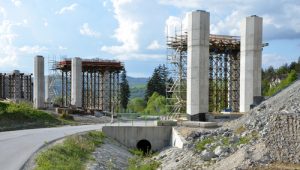
U.S. Sen. John Hoeven (R-ND) is determined to see that the country’s infrastructure gets updated and expanded via increased public-private investments that flow to the state and local levels.
“Reliable and safe infrastructure is vital to every person and industry across our country,” said Sen. Hoeven this week, noting that the American Society of Civil Engineers (ASCE) estimates the nation will need an additional $2 trillion above current projections in infrastructure investment by 2025.
To help bolster federal infrastructure spending, Sen. Hoeven on Jan. 16 sponsored the bipartisan Move America Act of 2019, S. 146, which would amend the Internal Revenue Code of 1986 to provide for Move America bonds and Move America credits, according to the legislation’s text. U.S. Sen. Ron Wyden (D-OR), ranking member of the U.S. Senate Finance Committee, is the original cosponsor of S. 146.
“The Move America Act would support an injection of much-needed capital into infrastructure projects throughout the nation,” the senator said on Wednesday.
S. 146 would expand tax-exempt private activity bonds and establish a new infrastructure tax credit to help fund infrastructure projects through private-public partnerships that would result in decreased overall costs, according to summary information provided by Sen. Hoeven’s office.
In turn, state and local governments would have more financial flexibility to construct needed infrastructure and/or improvements to projects that include roads, bridges, transit, ports, rail, airports, broadband, and water and sewer facilities.
“The bonds and tax credits created under our legislation provide a complement to federal funding sources and serve as cost-effective, flexible solutions for states and local governments, supporting the construction of a wide array of critical infrastructure,” said Sen. Hoeven. He cited Congress’ Joint Committee on Taxation estimates that Move America could leverage $8 billion in federal investment into $226 billion worth of bond authority over the next 10 years, or up to $56 billion in a decade in tax credits.
Move America bonds, for example, which permit states to issue tax-exempt bonds in partnership with private entities, would be allocated to each state based on population size, according to Hoeven’s summary of S. 146.
A bond would be treated as a tax-exempt private facility bond with certain exceptions and at least 95 percent of the net proceeds from the issuance of the bond must be used for infrastructure projects, which also would include docks and wharves, mass commuting facilities, and certain surface transportation projects eligible for federal assistance, projects for an international bridge or tunnel, or facilities for transferring freight from truck to rail or rail to truck, among others.
Move America tax credits would allow smaller states to trade in part or all of their bond allocation for federal tax credits at a 25 percent rate, according to the summary. The credits could be used in conjunction with Move America Bonds or with other federal grant or credit assistance programs, the summary says.
“America is facing an infrastructure crisis that requires an all hands on deck approach,” Rep. Wyden said. “From our biggest cities to our smallest towns, Move America gives local leaders the flexibility to quickly and efficiently jump start infrastructure projects in their own neighborhoods.”
S. 146 is supported by the U.S. Chamber of Commerce, ASCE, the American Road and Transportation Builders Association, Associated General Contractors, the American Association of Port Authorities, Airports Council International, the Association of Equipment Manufacturers, and the American Council of Engineering Companies, among others.
The U.S. Chamber of Commerce “applauds Senators Hoeven and Wyden for introducing the Move America Act, which would facilitate increased public-private partnerships that would supplement, not replace, increased federal investment,” the organization said in a written statement of support. “Enacting an infrastructure modernization bill is a top Chamber priority this year.”
The bill has been referred for consideration to the U.S. Senate Finance Committee.
This is the second attempt Sen. Hoeven is making with the measure, which he and Sen. Wyden originally introduced in May 2017. However, the same-named S. 1229 never made it out of the Senate Finance Committee during the 115th Congress.



